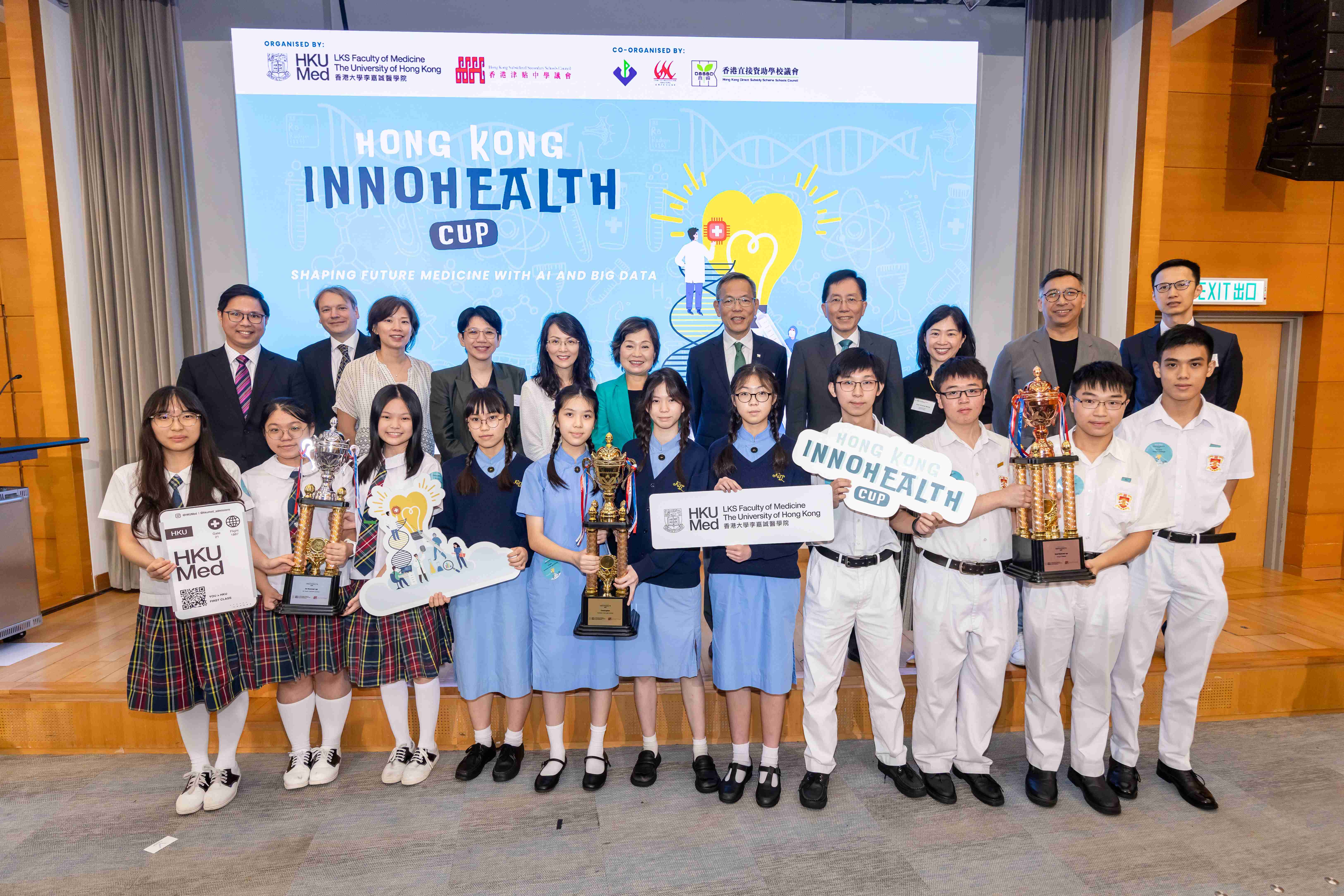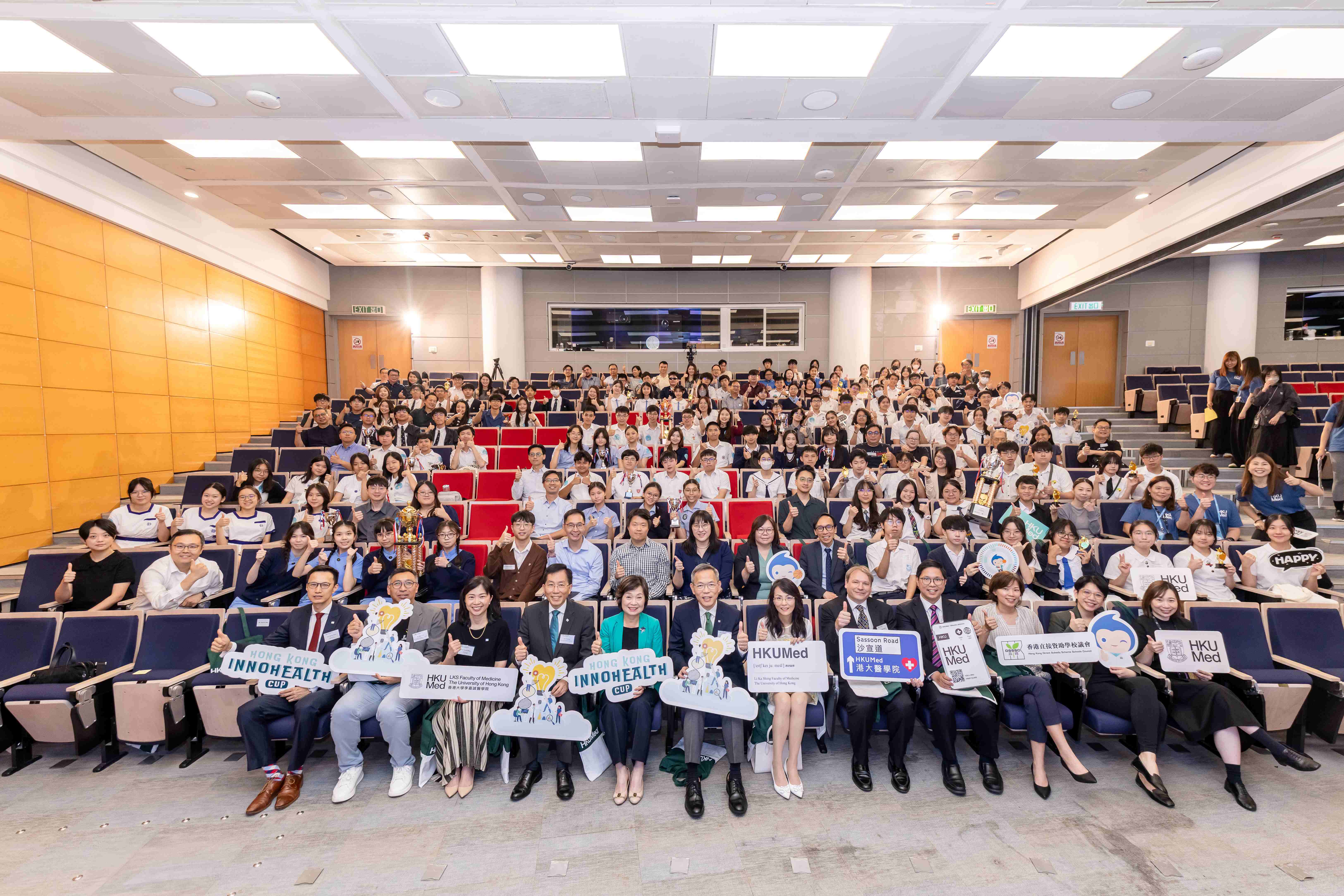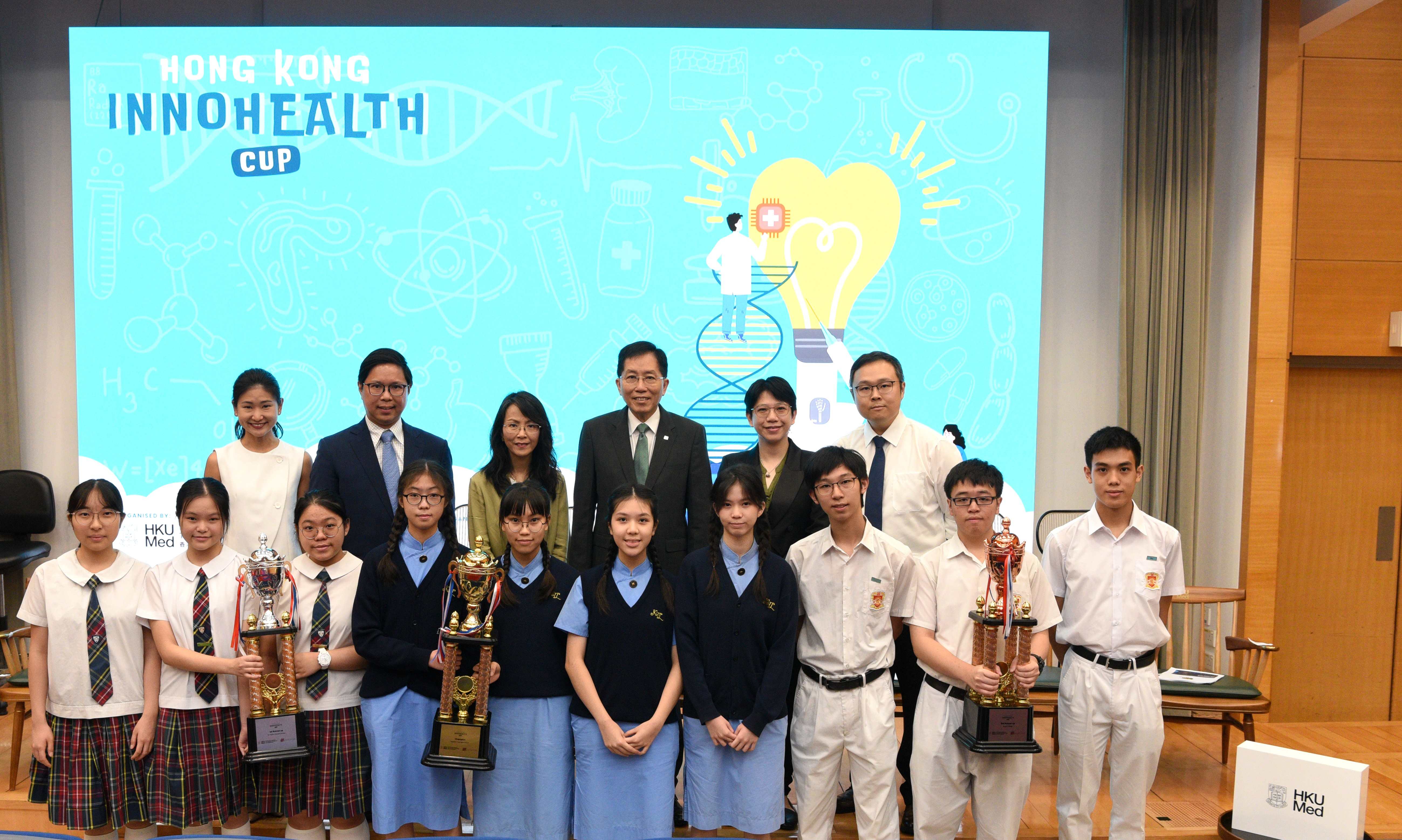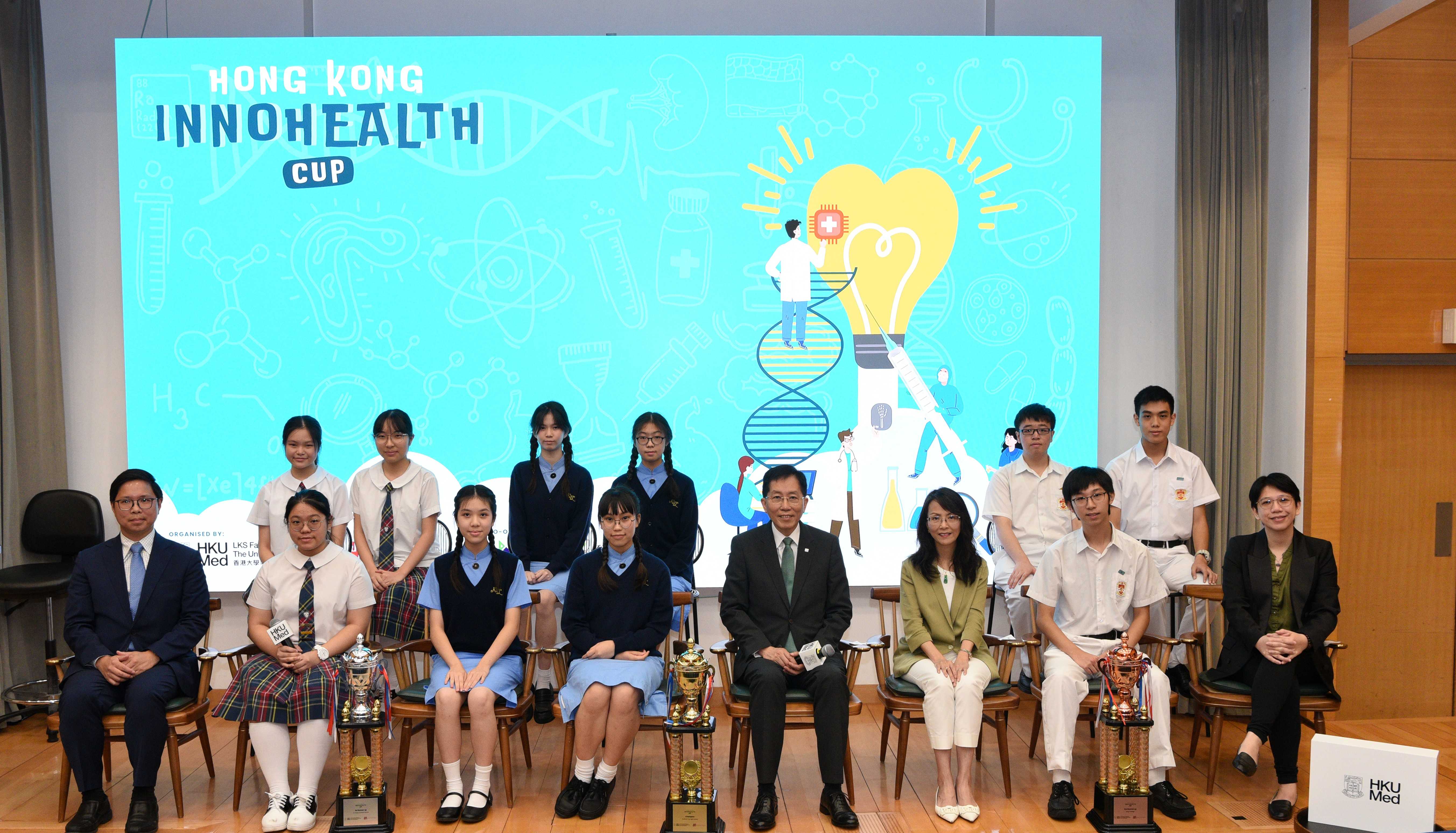21 July 2025
The LKS Faculty of Medicine of the University of Hong Kong (HKUMed) and the Hong Kong Subsidized Secondary Schools Council recently concluded the inaugural ‘Hong Kong InnoHealth Cup’, which was a resounding success. 12 finalist teams from secondary schools presented groundbreaking healthcare tech ideas to a panel of judges comprising HKUMed professors, who unanimously praised the participants for their deep medical knowledge, technological expertise and boundless creativity. The teams tackled real-world health challenges—from cancer to Alzheimer's disease—by harnessing tech, both traditional Chinese and western medicine, demonstrating significant potential for future practical applications. The winning teams will participate in a summer programme at HKUMed and Queen Mary Hospital, gaining hands-on clinical experience under the guidance of medical tutors to further broaden their medical horizons.
Innovative minds shaping the future of healthcare
Since its launch in April, this competition, themed ‘Intelligent Big Data Medical Applications’, has attracted over 500 students and teachers from 131 secondary schools. After fierce preliminary rounds, 12 of the most innovative teams made it to the finals. Expert judges rigorously evaluated the projects based on their innovation, practicality and technical feasibility. The Kowloon True Light School team emerged as the championship with an AI-powered cancer treatment project; St Paul's Convent School was first runner-up with an Alzheimer's risk tool; and King's College came in third with an AI tongue-diagnosis system.
The event featured Dr Choi Yuk-lin, Secretary for Education, as the guest of honour. She highlighted that AI applications have become a global trend and emphasised the government's commitment to nurturing students' interest in technology and scientific capabilities, thus contributing to the nation's development as an education and technology powerhouse.
Expert judges praise the participants for their creativity
Professor Chak-sing Lau, Vice-President & Pro-Vice-Chancellor (Health) of HKU and Dean of Medicine, expressed high praise for the inaugural competition, noting that the quality of all entries exceeded expectations. He stated, ‘This provides a valuable platform for young minds to practice innovation ideas and explore future possibilities in healthcare. The future belongs to the youth, and AI technology is reshaping healthcare. We are thrilled to see participants not only demonstrate keen insights into real-world medical challenges but also apply innovative thinking and technology to address these issues, showcasing their potential as future healthcare leaders and a deep commitment to human health and well-being.’
Principal Lee Yi-ying, Chairman of the Hong Kong Subsidized Secondary Schools Council, thanked all the supporting schools and emphasised, ‘Today's achievements are just the beginning. We hope students will bring about real change in the medical field and work together to create a healthier and more innovative future for Hong Kong.’
Professor Chan Ying-shing, the competition convenor, Senior Advisor to the Dean and Director of Campus Development and Infrastructure of HKUMed, added, ‘The participants demonstrated remarkable creativity, critical thinking, and interdisciplinary integration in the field of medical technology. They not only mastered the application of AI and big data but also effectively utilised this in real-life medical scenarios, proposing forward-thinking solutions.’
Participating teams demonstrate their exceptional capabilities
Professor Chak-sing Lau firmly believes that the ‘Hong Kong InnoHealth Cup’ platform can ignite a passion for medical innovation among the younger generation. He looks forward to expanding the competition in the future to cultivate more talent in the field, and advancing Hong Kong's medical technology development. In addition to the top three projects, other finalists also displayed diverse thinking and practical approaches in medical innovation, addressing a range of topics such as chronic disease management, mental health support, language therapy, posture correction, and skincare solutions.
Summary of Winning Projects
Champion – Kowloon True Light School
Project: AI driven peptide drug for cancer treatment
The champion team used artificial intelligence (AI) technology to develop a new peptide to inhibit cancer cell proliferation. Peptides are short protein molecules that can inhibit the function of certain protein molecules in cells by binding to them. EGFR (Epidermal Growth Factor Receptor) is one of the ‘molecular switch’ proteins that regulate cell proliferation. It is often over-active in cancer cells, causing cancer cells to proliferate in an uncontrolled fashion. Through bioinformatics and AI analyses, the peptide molecule designed by the team is predicted to bind to EGFR. Computer analyses predict that the affinity of this peptide is stronger than EGF, the natural binding partner of EGFR, therefore it is expected that this peptide can achieve the effect of inhibiting the proliferation of cancer cells. This solution needs further experimental validation, but its insightful use of AI and big data has opened up the potential to develop effective alternatives to existing chemotherapy drugs.
First runner-up – St Paul's Convent School
Project: ‘Brain’ Buddy
With a new Alzheimer's patient diagnosed every three seconds globally, early intervention is crucial. The award-winning team developed an early-detection app called ‘Brain Buddy’, which utilises AI to analyse four biomarkers: language ability, reaction speed, eye movement, and pupil response to light. By comparing these metrics with healthy data, the app assesses the risk of disease and encourages regular screenings, facilitating timely intervention and slowing disease progression.
Second runner-up – King's College
Project: Dr Zhi-Intelligent Medical Four Diagnoses (Zhi Yi Si Zhen)
The project digitises traditional Chinese medicine's diagnostic methods—observation, listening, enquiry, and palpation diagnosis—into the AI-powered ‘Dr Zhi’ smart doctor system. Utilising computer vision, it analyses tongue patterns in real-time and supports natural language consultations in Cantonese, Mandarin and English. By leveraging a structured TCM database and dietary guidelines, it offers personalised health advice. Combining NLP for realistic dialogue with knowledge graph technology, it ensures accurate diagnoses and provides professional wellness guidance anytime, anywhere.
Media enquiries
Please contact LKS Faculty of Medicine of The University of Hong Kong by email (medmedia@hku.hk).





Follow HKUMed